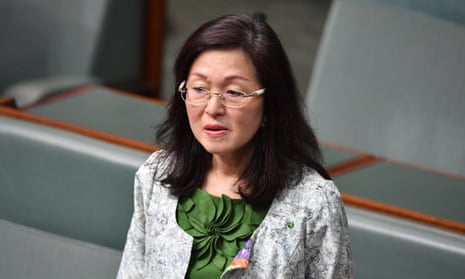Challenges against the election of Josh Frydenberg and Gladys Liu must fail because they do not prove that voters changed their vote after reading controversial Chinese-language signs, the Australian Electoral Commission has said.
The AEC has asked the federal court to throw out both cases, arguing the petitions do not contain enough detail to overturn the election of the treasurer and deputy Liberal leader in Kooyong and the Liberal MP in Chisholm.
The petitions to the court from the unsuccessful independent candidate for Kooyong, Oliver Yates, and Chisholm constituents Naomi Leslie Hall and Vanessa Claire Garbett complain that Chinese-language signs were likely to mislead voters because they used the AEC’s purple colours and instructed voters the “correct” or “right” way to vote was to put a 1 next to the Liberal party candidate.
Frydenberg and Liu have claimed the Liberal party’s acting Victorian director, Simon Frost, “intended” the signs to say “to make your vote count put a 1 next to the Liberal candidate” but admit the translation meant “correct way to vote”, “correct voting method” or “the right way to vote”.
In near-identical responses to both cases, the AEC told the court that the “petition fails to set out at all, let alone with sufficient particularity, any facts or matters on the basis of which it might be concluded that it was likely that on polling day, electors able to read Chinese characters, upon seeing and reading the corflute, cast their vote in a manner different from what they had previously intended”.
The AEC admitted that “it is possible” that votes in Chisholm and Kooyong were cast by electors who read the Chinese signs or were told about them by someone who had read the signs.
But it said the petitions failed to set out “the facts or matters on the basis of which the petitioner alleges that it is likely” that people then voted number 1 for or gave their preference to Liu or Frydenberg “notwithstanding that such was not the vote that they otherwise intended to cast”.
It submitted the petitions failed to comply with section 355 of the Electoral Act – which requires facts to be detailed with “sufficient particularity” – and that as a result the cases should not be heard, citing section 358 which allows a court to throw a case out for technical failures or allow it to be heard despite some missing detail.
The AEC raised the same technical objection in relation to paragraphs of the petitions claiming that the two candidates’ preferred results were “likely to have been affected” by the signs.
The AEC responses admit that on election day, 18 May, it formed the view the Chinese-language signs did not breach the provision banning publications which are “likely to mislead an elector in relation to the casting of a vote” and so did not order them to be taken down.
It explained that the provision bans misleading voters with respect to “the act of recording or expressing the political judgment which an elector has made rather than the formation of that judgment”.

Yates, Hall and Garbett argue that by instructing voters on the “correct” or “right” way to vote, the signs implied that a vote for anyone other than the Liberal candidate would be invalid and they therefore did meet this higher threshold.
The AEC admitted the petitioners’ translations were correct and that Liu and Frydenberg’s signs had used “the same” colour scheme as the AEC; Frydenberg and Liu conceded only that it was “similar”.
Frydenberg is facing a separate challenge from a Kooyong resident, Michael Staindl, who has argued he is disqualified by section 44(1) of the constitution because he is a citizen of Hungary, which Frydenberg denies.
The electoral law challenges return to the federal court on 11 October. The court of disputed returns eligibility challenge against Frydenberg is yet to be listed.
